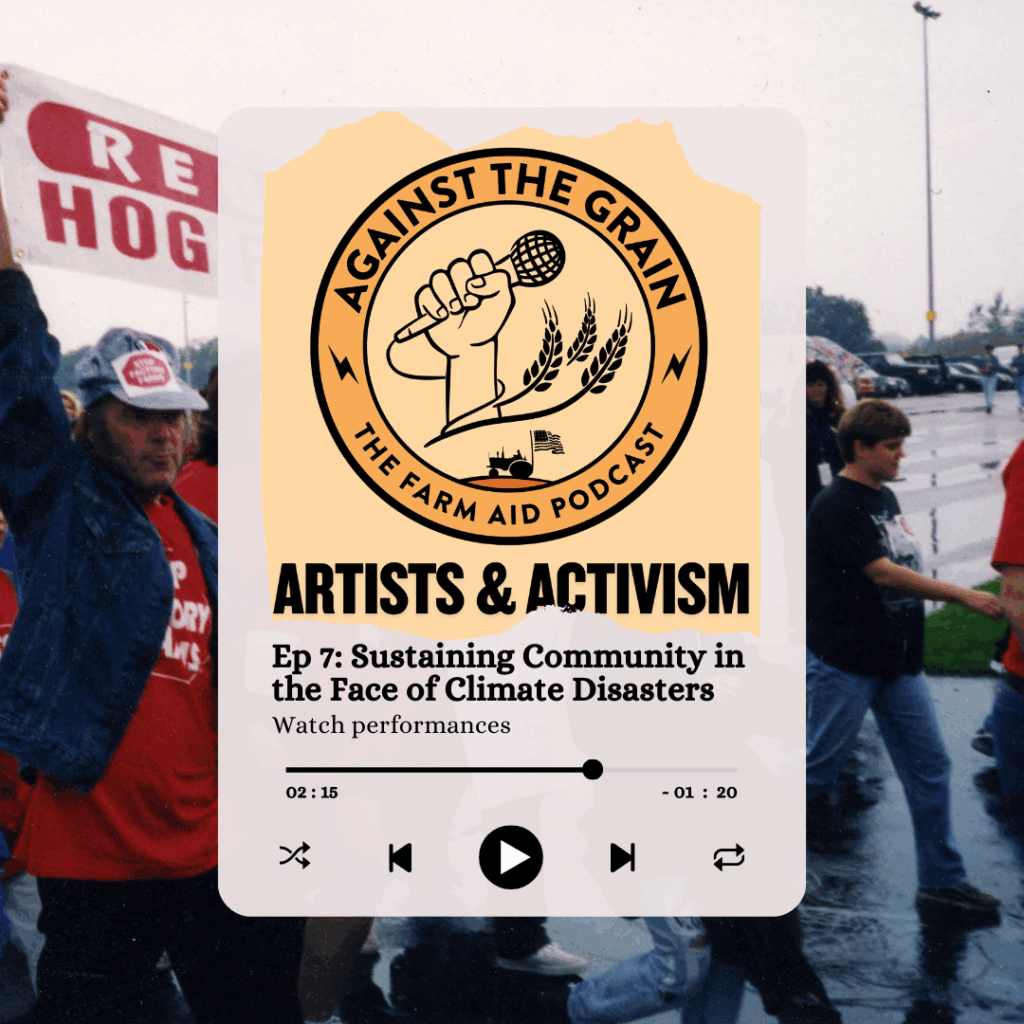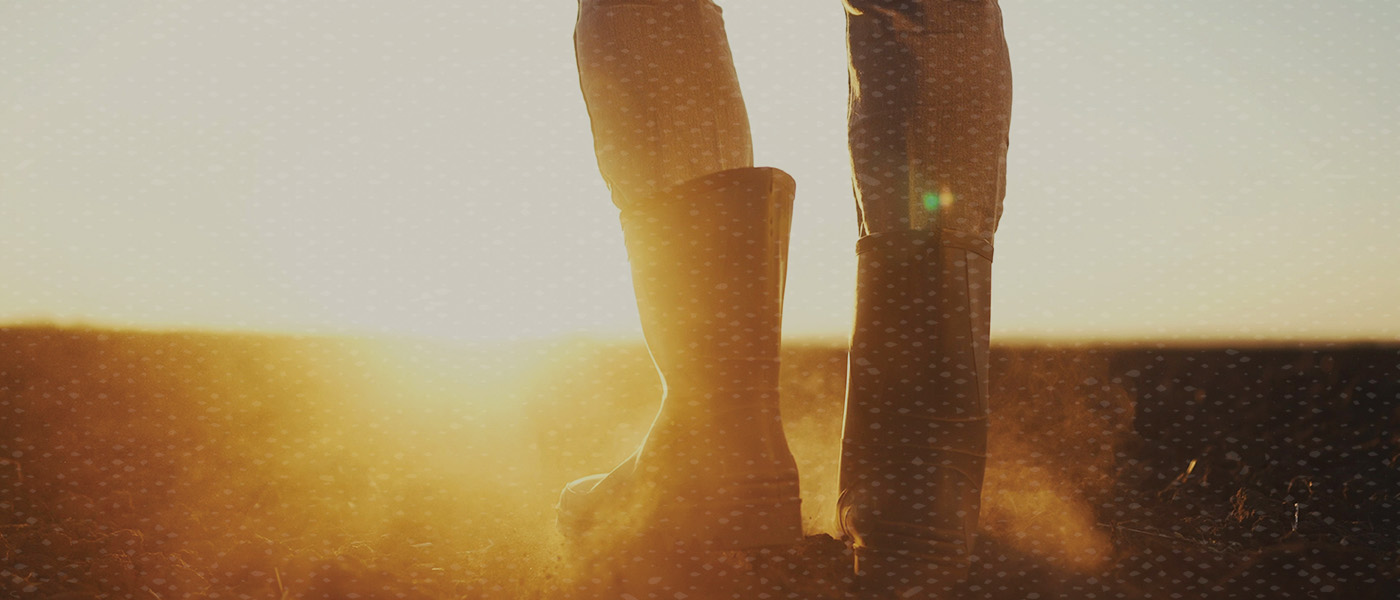In this final episode of Against the Grain’s Artists & Activism series, we take you back to Luck Reunion where we recorded a panel conversation in front of a live audience. This panel had four artists who lived through various climate disasters and have been working to sustain their communities in the aftermath. Listen in as we talk to Farm Aid board artist Margo Price, JJ Tourville, Matthew Logan Vasquez and Tommy Newport, followed by a brilliant question and answer session with the audience.
Listen to the episode below. And, make sure to subscribe in your podcast app of choice!
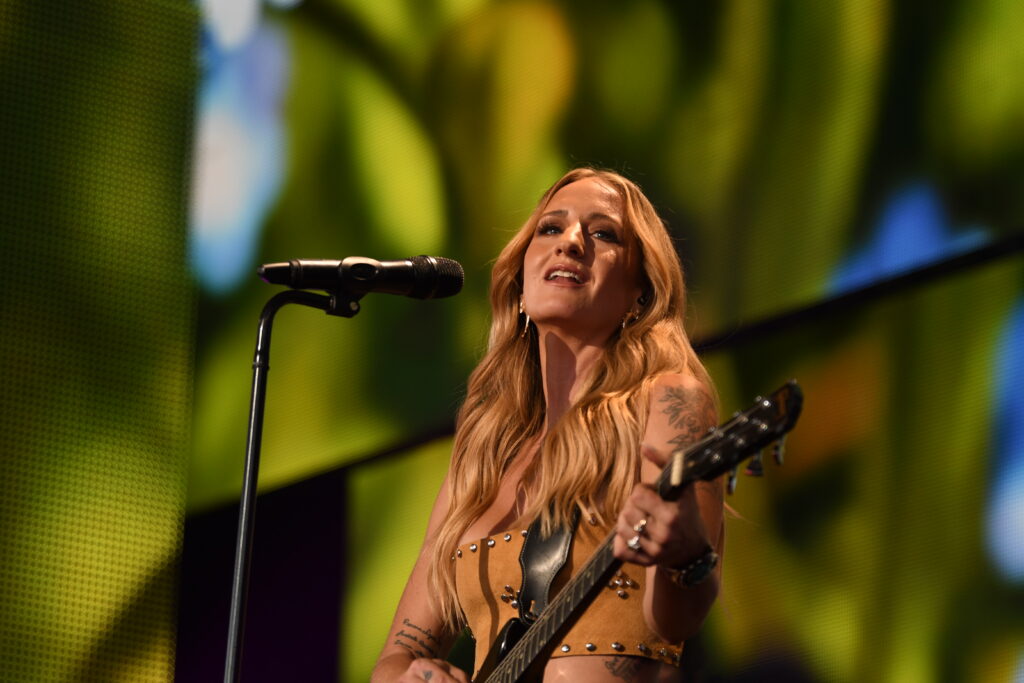
Margo Price at Farm Aid 2023. Photo © Sharon Carone
Nearly a decade ago, Margo Price turned Nashville on its head with her breakthrough, beloved debut solo album, Midwest Farmer’s Daughter. Released in the throes of bro-country and before pop stars were crossing over into the genre left and right, it showcased an artist completely unafraid to double down not only on herself, but what she’d always loved: classic country songs written from the intellect and the gut, hell-bent on truth-telling and both timeless and urgent all at once. Respected by her peers, praised by critics and beloved by her fans, Price created a lane where independent-minded, insurgent country music can exist and thrive alongside the mainstream, and became an ardent fighter for her beliefs in a genre where the norm is to shut up and sing. A trailblazer and a champion for the craft, Price redefined what it meant to be a modern country artist.
Since releasing Midwest Farmer’s Daughter, Price has barely slowed down. She’s made four records, played Saturday Night Live, been nominated for a Grammy, toured the world alongside artists like Chris Stapleton and Willie Nelson, released a lauded memoir (Maybe We’ll Make It, due on paperback September 2nd), became an in-demand producer and was appointed as the first female board member of Nelson’s Farm Aid. And she’s been fearless when it came to genre, venturing into psychedelic rock on her most recent, Jonathan Wilson-produced record, Strays. It would have been easiest to just stay that course, and keep running. But Price doesn’t follow success or comfort. She follows the art.
Price had also established herself as one of the most passionate, vocal artists in country music and beyond when it came to standing up for political and personal causes, from the presidential election, to abortion to gun control: happily hard headed when it came to the fight for equality and justice, especially for the working class and underserved in our society. Price has always brilliantly woven her activism into her songs, but her role as a spokesperson had started to overtake, on occasion, her role as a songwriter. She wanted to focus on using her written word to deliver the most potent punch of all.
And now she’s back with an exquisite, truly timeless album that reconnects with her roots and pays tribute to the art of the country song, inspired in part by the legends whom she now calls colleagues and friends. Hard Headed Woman is both a look forward and a look back: a way to march forward while staying true to yourself when the path of less resistance is right there in front of us, and short cuts are around every corner. And a way to look back when we need to trim what is no longer working, and to stay connected with where we’re from. It is a promise and a manifesto, a love song to both a city and a genre, and a defiant cry for individuality.
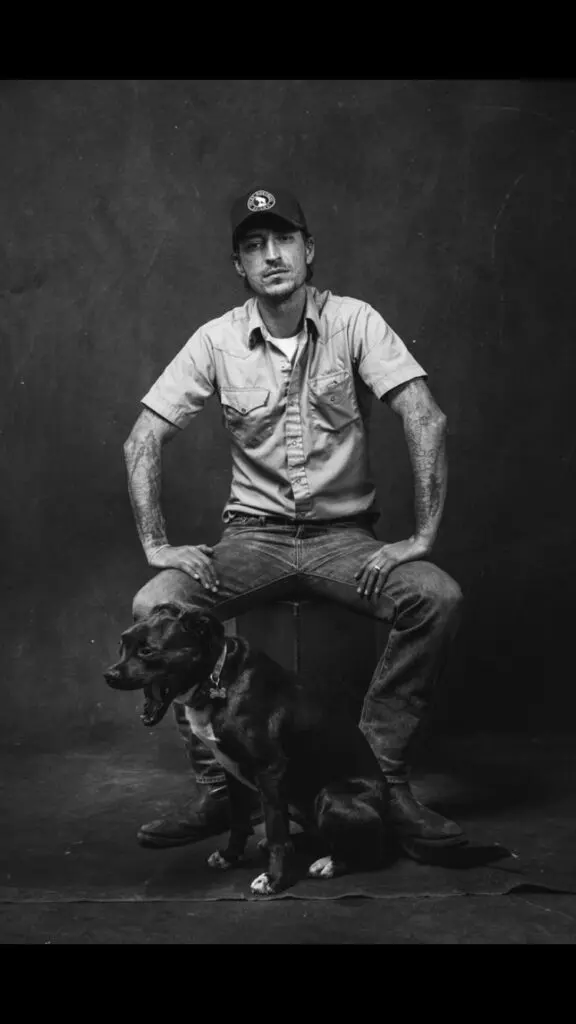
Photo by Joshua Black Wilkins
John James Tourville originally from St. Paul Minnesota, is a former freight train hobo, who worked a wide variety of blue collar jobs, has been playing music professionally for the past 15 years. He is a member of the band The Deslondes and has performed on hundreds of sessions for many artists between Nashville, New Orleans and North Carolina, including artists like Sunny War, Indigo De Souza, Ian Noe, The War on Drugs and Fust. He has produced albums for artists like Riley Downing, John R Miller and Emily Nenni. “My wife and I care about our community very much,” JJ says, “and we try to be as active as possible with community building, mutual aid and support while raising our two children.”
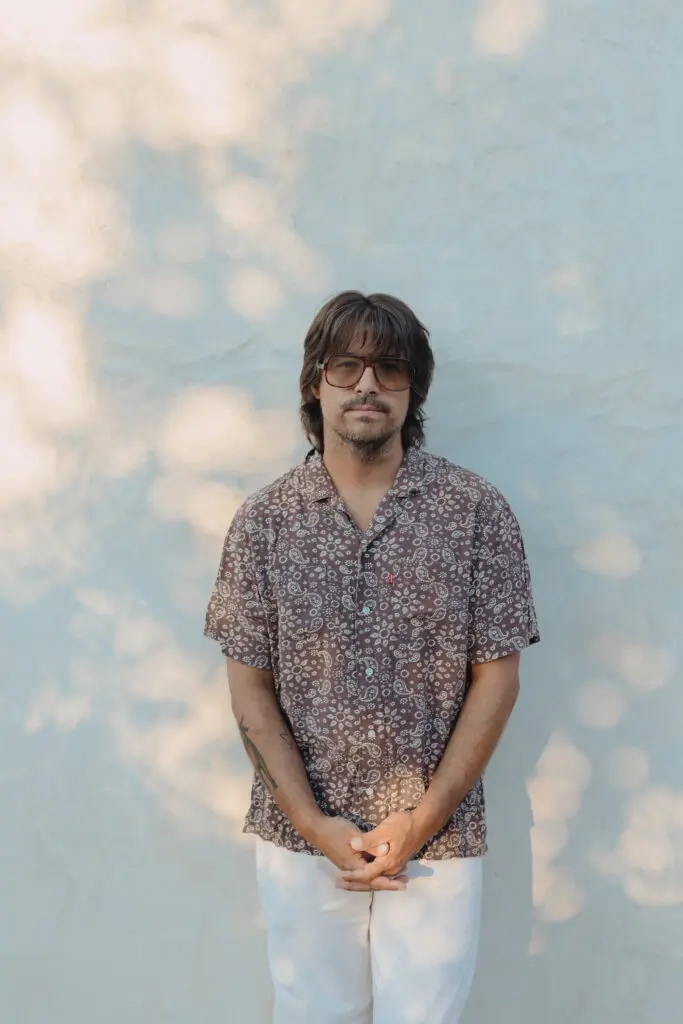
Matthew Logan Vasquez is best known as the co‑founder and frontman for shapeshifting heartland indie rockers Delta Spirit, Matthew Logan Vasquez’s fiery delivery and thought‑provoking lyrics draw from a huge and versatile well of influences, including Gordon Gano, Kurt Cobain, Neil Young and Thom Yorke. As a solo artist, he juggles elements of indie rock, electronic pop, R&B and soulful Americana, flirting with despondency, but ultimately succumbing to beatitude. Vasquez’s latest release Frank’s Full Moon Saloon is an album that delivers more raw versions of songs that span the band’s 20 year career. It was released in February this year. Parts 2 & 3 of the Frank’s series will be rolling out through 2025.
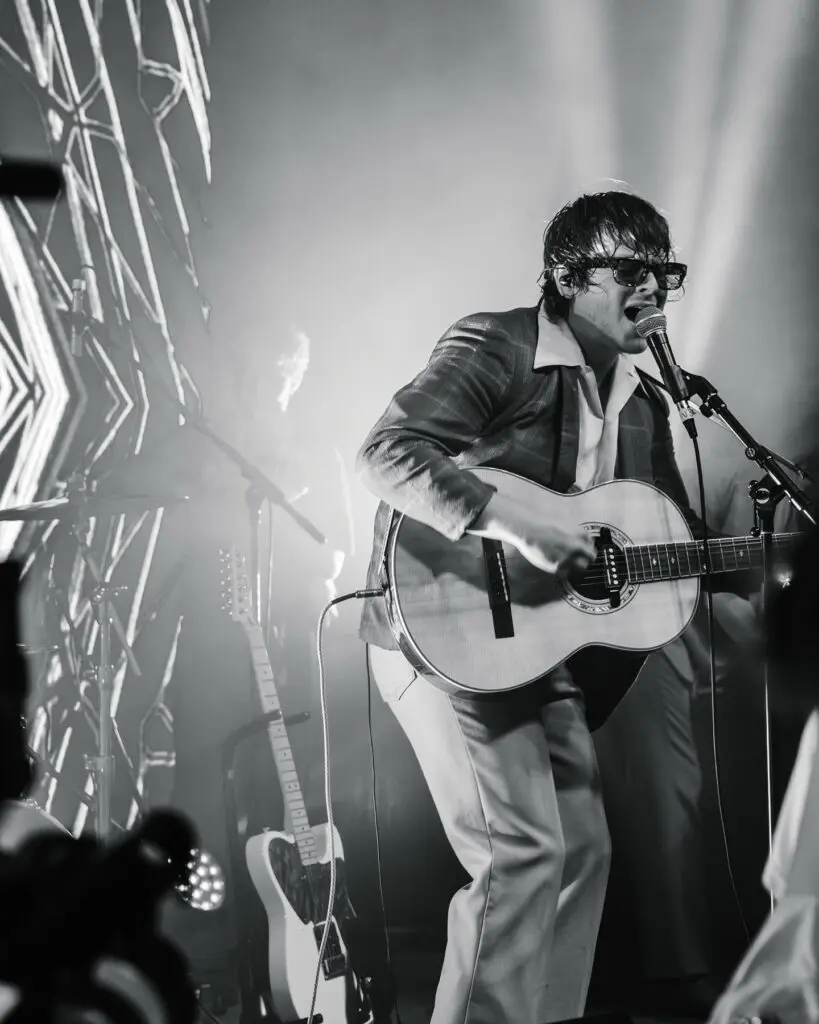
Tommy Newport is a British-American singer known for his infectious falsetto-steeped indie anthems. He first garnered buzz with his 2018 debut, ‘Just To Be Ironic,’ while he was still a teenager. Newport continued to develop his sound, releasing 2019’s ‘Tommy Gun’ EP and 2021’s ‘Ultra Mango’ EP and ‘Liquid’ EP. Fresh off the heels of his debut Lollapalooza performance, he released his new album ‘Mister Domino’ in 2024. He’s received plenty of critical acclaim along the way from The FADER, Complex, Hypebeast, High Snobiety, Pigeons & Planes, PAPER, Lyrical Lemonade, COLORS & more. Tommy’s already toured extensively across North America & Europe, been championed by legendary tastemakers like Zane Lowe, Elton John & Giles Peterson, and collaborated with Grammy nominees EARTHGANG. Tommy also recently featured on “Red Sky,” a fan favorite on 21 Savage’s latest album ‘American Dream,’ and “Comes & Goes” on BigXThaPlug’s new album ‘Take Care.’
Episode 7: Sustaining Community in the Face of Climate Disasters
KURN: Hello and welcome to Against the Grain, the Farm Aid podcast. I’m Jessica Ilyse Kurn,
FOLEY: and I’m Michael Stewart Foley.
KURN: Thanks for joining us for our 7th and final episode of our Artists & Activism series. To wrap up, we’re taking you back to Luck Reunion’s 10th anniversary festival. You’ve heard us talk about Luck Reunion before, the festival held on Willie Nelson’s ranch, where we’ve been so fortunate to interview lots of artists and chefs the past couple of years.
FOLEY: Yeah, this year, Farm Aid hosted a couple of panel discussions on the community conversation stage. We recorded one of those conversations live for the podcast.
KURN: The Against the Grain panel included Farm Aid board artist Margo Price, JJ Tourville of the band The Deslondes, Matthew Logan Vasquez and Tommy Newport. They’ve all lived through climate catastrophes, and each one has been active in trying to pick up the pieces in their communities.
FOLEY: But we’ll let them tell their stories. Here’s Margo to start us off.
PRICE: Yeah, I was in East Nashville at Crowbar. And my husband dragged me out of there right before a tornado literally tore off the side of the building, um, you know, it was, it was really tough to see our city go through that, but the way the community comes together and lifts each other up and supports each other, you know, it always, it always gives me hope. I also, my family fell victim to the farming crisis of the mid 1980s and lost their farm right around the same time that the first Farm Aid happened. And um that loss was really devastating. I saw it um impacts all of my, all of my family and so it feels really good to sit as a board member next to. Legends like Willie and Neil and and be able to give back a little bit.
FOLEY: Awesome, thank you. Uh, JJ, and we talked the other day on the phone. Maybe you could tell me about this when you moved from New Orleans to Asheville.
TOURVILLE: Yes, so, uh, my wife and I and our kids moved from New Orleans and my wife had been wanting to move since Katrina, so, you know, she was there during all of that and, and I mean, yeah. So, you know, after our second kid, we chose to move to Asheville and we never thought there’d be a hurricane up there, you know. Also, likewise, you know, we were super lucky and we had no damage, you know, during the storm, um. My kids were bucketing water throughout the whole storm and saved their a basement, but I mean, so many people lost their homes, you know, across the street trees fell on neighbors’ houses and And, and yeah, I mean. The biggest thing, you know, I saw through the whole experience is How, you know, a shared trauma or the, you know, shared traumatic event like this just brought the community together in ways where it’s like, you know, me and my wife are super chatty and we love just chatting with everyone and Always talking to the neighbors, but there’s, you know, neighbors would come out, we’d never met and be like, we need water or like, you know, do you have this and, and.
It, it’s unfortunate that something so devastating brings people together, but it’s, it is true. Oh yeah, anyway, yeah, thank you.
FOLEY: Matt, we also talked the other day. Yeah, tell us about this uh water warrior fighting down?
LOGAN VASQUEZ: Well, you know, we live out here in the hill country and you could see it’s, uh, as you can feel it’s really warm and hot and arid today. Uh, we’ve been experiencing these historic droughts, uh, over the last 20 years and is, you know, if you’ve been coming to luck over the, over the past 10 years, luck, you see all these houses going up and just so many people moving out here to the hill country. And, uh, part of that is people don’t know how to live with the land and they don’t know how they want to keep their, uh, their sod lawns going and, uh, we had that coupled with a public utility that was at a 40% leakage rate and, uh, so our, so our swimming holes in Wimberley went dry for the second year in a row in the summer, which stinks, you know, it’s August, it’s so hot. It’s hot here until October for those you locals and, uh, you know, it’s just stinks when, uh, When the public utility refused to fix their stuff and then over over pumped 160 million gallons. So yeah, it’s insane. Uh, but, you know, they’ve been, they’ve been working to fix that and, uh, the county has been doing a really good job trying to get it all organized again, but, you know, it’s crazy.
FOLEY: Yeah, awesome, thank you. And Tommy. You came to LA via Kansas, right?
NEWPORT: Yeah, yeah, yeah,
FOLEY: um, but, uh, lives in Altadena, I’m gonna say present tense, still lives in Altadena. Yeah, could you tell us a little bit about your story?
NEWPORT: Yeah, uh, I’m from small town Kansas. I live in Wichita and uh I moved to Los Angeles to further my career as a musician, um. I moved there about 3 years ago and I struggled to fit in or find like where I wanted to be in my area, and Los Angeles is very like, there’s all these different multicultural areas and You have to find the one that’s right for you. Um, and I found that pretty quickly. I found this little foothill town in called Altadena. It’s quiet, people are friendly and mom and pop shops, and it reminded me of the Midwest a lot.
Yeah, I mean, as everyone has seen in California, you know, the wildfires have been uncontrollable and. Uh, there’s been a lot of negligence and uh unfortunate events that are happening there, um. But I, you know, that week I saw the Palisades were on fire and, you know, we get regrettably it was like another day, you know, it was like, oh, there’s fires in LA so uh I’ll just keep my eye on it and um. I was home late at night and there was a warning for high winds and and and things of that of that nature and the power went out So I just got in the car and drove to the nearest light and. I was kind of looking around. It was very windy.
It was kind of chaotic. People were leaving and I was just sort of like not sure what’s going on. And then I looked at the, the hillside and it was the, the very beginnings of the Eden fire there, um, so I left, um, and when I came back the next day to see if I could get some things out of my house, um. It was already too late by that point. But yeah, like a lot of like what you guys said here, um, you know, you’re talking about, you know, government negligence, private company negligence, gas companies, insurance companies. Uh, electric companies, um, plagued by capitalism and cutting corners, and it’s a shame, but these moments like bring communities together, uh, make people stronger and create things like what you’re sitting at right now, which is, uh, causes to, to fight against climate change and climate crisis, very, very, very small things snowball into big disasters, and it’s a shame.
KURN: And I can imagine that when this type of a disaster happens that yes, you meet your neighbors and people come together, but then also a lot of people must flee the area. So how do you keep a community together?
LOGAN VASQUEZ: There are are pockets and areas of But the melancholy that it brought to the entire state, to America, really, I think there were no boundaries to community in those weeks, um, and I found that absolutely incredible. There was nowhere that you couldn’t go to get help, uh, from community, from people like you, um, so it was unbelievable the amount of people that really care about their city and, and their state.
TOURVILLE: You know, to your question, I think with sustaining community in the aftermath of disaster, it’s kind of the, the long game of what’s happened and what needs to be done, and I feel like you can sustain community by what actions need to continue to happen in the aftermath with rebuilding, with resources, with funding, with, you know, benefit. Shows like, you know, it’s not a new thing, but with these compilation albums that artists have been doing, I feel like that’s a huge fundraising opportunity that’s like what we can do and and if people can support that, it’s, it helps so much and in and that builds community too with, with, you know, artists and those who listen to music, you know, to. For the folks that need relief, you know.
KURN: Matt, you were talking about a different type of climate disaster where it’s kind of a slow moving train. So what about the community around that and coming together?
LOGAN VASQUEZ: In Dripping Springs, there were, there was meant to be a like a 5,000 cap music venue and they were supposed to hold a bunch of water and then also where they were gonna uh leave their gray water and black water off this property and uh. And they all of Dripping Springs showed up. You could, uh, like a standing room only in that city council meeting, and they lit them up and they canceled it. So that’s pretty great, right? It’s not happening. Yeah.
And the same thing in Wimberley, we have the Wimberley Watershed and we have a bunch of people that are constantly getting involved. With that and, and just they basically took over the lawsuit against Aqua, Texas, uh, for the county. And so they raised enough money to just basically fight it in court and, you know, sticking with the bill for uh overpumping. But yeah, you know, community makes it happen.
FOLEY: Great, and we were talking on the phone about the who makes up that board, right, that this is not a partisan issue. You were explaining like the political makeup of that board,
LOGAN VASQUEZ: Right? Yeah, I mean, isn’t really a, it’s not a thing and You know, my, my libertarian stepdad, he, he collects, he has enough rainwater collected in his cisterns to last him a year, you know, uh, no problem, and it, it, it does rain in this area, and it rains a lot just really quick. So I mean, the water’s a lot softer when it comes from the sky and pulling it out of the ground and your well is a time bomb anyway. It’s so expensive to maintain and, uh, it’s gonna fall apart or go dry. So I mean really that is the solution is like use native grass and collect rainwater if you can afford it.
FOLEY: And Margo, the tornado came how soon before the pandemic, like a couple of weeks or something, so you had like a double whammy.
PRICE: Absolutely. It was um I remember there being a tornado benefit and it was like right as COVID was hitting and we were all reading, you know, like, nobody should be out, we’re all sharing mics and Getting all close together, but it was, that was, that was pretty devastating for the community too because artists couldn’t perform, we couldn’t do benefit shows, you know, like nobody was getting together, um, and I was there also, there was a flood in Nashville that happened and I was pregnant and suddenly there was just like a river running through our home. And luckily we had tons of friends come over. They helped us lift our piano up on cinder blocks, and we got all of our instruments out of there, but that was back in 2010. And, um, you know, it just seems like. Nobody’s really prepared for a lot of these things.
PRICE: Like, we don’t have a basement and, you know, it’s tornado season again, so it’s, it’s scary to even think about it, but, um, I don’t know. I, I really don’t even know what the answer is, and I, I feel like people try to go out to our, you know, The meetings and you go try to show up and I’ve been to many protests and tried to talk sense into bullheaded politicians and you know, sometimes it doesn’t work, but it doesn’t mean that you stop showing up. You keep showing up, you keep bothering everybody, keep calling senators, congressmen, and
FOLEY: I don’t know. Was he tell somebody listens to love it. I mean that’s showing up that’s, uh, we talk about it all the time in Farm Aid. This is the Willie Nelson way, right? Like not partisan, right? People across the political spectrum love him and his, his main political intervention as a citizen, as an artist is to show up, right?
FOLEY: Can we talk a little bit more about like you’ve mentioned benefits and compilation albums like particularly the role that artists can play in sustaining community because there’s obviously. Everyone can play some kind of role in one way or another, but what are, what are the best ways for artists to show up?
NEWPORT: That’s the only way to changes and I feel like I don’t know what Willie did, you know, he wrote songs about things he cared about and I know we all love songs and we know the words to them, so. And I think it’s, uh, just use your platform, um, no matter how big of an artist you are, there are people listening to you, and these are people that are passionate about you, you know what I mean? They, they want to follow what you support and what you’re doing and as an artist, using your platform to share your story or share what you want the world to be like, I think is important at times, so.
TOURVILLE: Yeah, I, I totally agree with that. Using the platform and being like unafraid of whatever industry pressure or anything to just speak for what’s right and show up in all ways with being creative and politically present, you know, and environmentally present, just show up as like a person, you know, no matter what.
FOLEY: What happens when you get the usual shut up and sing?
TOURVILLE: I don’t sing. I mean, I mean, you gotta, you gotta just still like say it though, you know what I mean? I mean,
PRICE: I probably people probably wanted me to shut up a long time ago. I’m sure I pissed off many, many fans, but I just, I don’t know, I speak from my heart and hope that the message. Gets through and know that I’m doing it out of a place of love, you know. Also, everybody here has the ability to vote with their dollar. Where you spend your money right now it’s very fucking powerful. Cancel your Amazon, cancel your Spotify, screw all these corporations that are ruining everything. It’s, that’s the only thing that we have.
PRICE: That’s our dollar. And then when that strike happened the other day and everybody’s like, don’t go to Target, don’t go to Walmart. I’m like, I haven’t been shopping at Walmart.
NEWPORT: I think. The biggest thing for anyone out here right now, and I’m I’m sure nobody out here feels this way, but if you’re indifferent about climate change or that word doesn’t sit with you, it’s in no one’s interests, you know, in this country, whether it’s through capitalism or big businesses or politicians or this is not in their interest for you to believe in that. So if, if you stay a non-believer of climate change, they keep making money, so it’s all I can say.
PRICE: We want to leave people with a call to action at the end of each podcast episode, so you kind of talked a little bit about what you can do, don’t shop certain places, vote. Is there anything else and Not just about climate change, but also about building community.
NEWPORT: Building community is, uh, it was strange for me because I’d never really been involved in that until I needed a community. I needed aid. I needed funding, um. And I don’t, I think a lot of people will go through this life not needing those things, um. But if you can find it within yourself to just be a part of your communities that support people that need you, um, I think that’s very helpful and, and go out of your way to, you know, join into these communities that are local to you that, that can support people in some kind of way. Uh, I think that’s important, um, just being aware and privy to it,
LOGAN VASQUEZ: you know. Yeah, I’d say, uh, for our little issue in the hill country, I’d say, you know, look up on the LCRA website, Lower Colorado River Authority, you know, uh, they actually give you rebates for cutting the cover on your pool. You have $50 for cover on your pool, man. You kill your lawn, you get some money. That’s a good deal. That’s government working for you. Uh.
You know, uh, we do in, in Wimberley have got these opera house shows that are pretty awesome, uh, and those raise money towards the Wimberley watershed. I mean, Drip knows what’s up and y’all up here, it’s great. So, you know, just keep working at it and, uh, you know, don’t water your damn lawn and especially in the summer or just ever, uh, you know, your drainage pi I take care of you guys septic. You’re good. All right, thanks.
TOURVILLE: I mean, I guess I would say just, you know, get involved as much as you can with whatever your organizations are around you. Into anyone in need, you know, like, I know it’s, it’s overwhelming to find organizations that seem like, is this the right one, but honestly like just like going for it no matter what and just showing up and trying to find somewhere you can help out is huge too, you know, no matter. You know, is is little time you may have or anything, just giving a little is is huge, you know, and if everyone did that, it’s, that’s big.
FOLEY: We were talking, you and I were talking in fact about some of the compilation records. You want to shout out some of the compilation records and organizations?
TOURVILLE: you know, that’s like Rusty Sutton kind of helped to put that together in North Carolina, you know. And I mean, that’s done huge, you know, my wife and I work with Beloved in Asheville and other nonprofits and like that’s helped huge, you know,
PRICE: yeah. Oh, OK, I’ll just add one more thing. Um, I watched this documentary, everyone should go watch it. It’s called Join or Die. And it’s kind of about how the fabric of America was built on clubs and communities and how everybody, you know, used to be in bowling clubs and card clubs and you know your neighbor and now everybody is so divided, everybody is so scared of talking to each other that there’s just this level of mistrust that is there, but I think that if we all can communicate, have those awkward conversations at your family dinner, go out, you know, and just, just talk to somebody and You know, even if you know that they feel differently than you, that’s where real change is made 1 to 1, when you’re having a heart to heart with your racist uncle. I don’t know, you know, but yeah, go watch Joy or Die and uh use your social capital.
FOLEY: Or maybe like John Prine said blow up your TV right?
KURN: Then you can’t watch the documentary.
FOLEY: Should we take some questions from the audience? The idea behind this was that we get to, uh, hear from some of y’all, and you can ask questions of our illustrious panel.
AUDIENCE MEMBER: I’m from Asheville, North Carolina, so thanks for giving some presence to the predicament that’s ongoing and will be devastating for years. There was a whole lot of winners and losers in that scenario. I grew up in Black Mountain. My church was in Swansea. That’s the exact route all that water thunders out mouthed and washed away versus people in better elevations. They did all right. My, my folks did all right and I know some my good friends that didn’t do all right. And then Austin I’m all right. I’m all right. I’m from here now. I’m in Austin for a bit, but repping Nashville it up here, um. But also thinking about the Palisades, fire versus the Eaton fire. Those are two different discussions when they talk about the allocations of money that the city is going to give back to those communities and the prioritization of those teams working on them. So my question would be, how do you see class consciousness and climate change being an intertwined conversation or um something we need to combat equally instead of letting the, the ones who can rise and the ones who can’t be forgotten.
TOURVILLE: That’s a great question. I mean, it’s all about our organizations, you know, like Farm Aid and like all these organizations. So when FEMA showed up in Asheville, you know, they were up off uh Brevard Road, very affluent. It’s like no one who needed the help that couldn’t, they couldn’t get there. It’s like, oh yeah, go get your aid, but it’s like. If you’re in this, if we, or if you’re out in the county, I mean, there’s a lot of FEMA out in the counties too, but I mean, Mountain Bizors, uh, which is like SBA affiliate, they had like millions of dollars in grants for folks that, you know, for everyone, you know, and and it’s these organizations that are spreading it around because FEMA will show up or other people will show up and they just go where they’re told to go, but it it takes the people and the groundwork.
To know where the help is needed and so these organizations, I feel like are are crooked like the clutch, you know what I mean, for knowing where it needs to go and it takes all of us in the community for that to happen, you know, for the, for to be informed, you know. Yeah,
NEWPORT: I definitely think that we saw that with uh Palisades and the fires and, um, it’s a hard conversation because It’s so entangled in the fabric of this country, um, the way that we operate with our insurance agencies and, and the way that that cities operate with their more profitable areas and and such, um. Yeah, I think what you said is it it’s, I think with a lot of things, it’s um it has to be a community that rises up and um.
LOGAN VASQUEZ: You know,
NEWPORT: really makes waves to, to make change. It’s a hard thing. It’s a really hard thing. So, but community building, continuing to do things for 40 years straight, um, not giving up on things, definitely that’s the most important thing.
FOLEY: Appreciate the question. I always wanted to be Oprah. Thank you.
PRICE: Yeah.
AUDIENCE MEMBER: Hello, uh, great to hear from you guys tonight. Mr. Surf Guy with a black I get you, yeah. Um, so you mentioned that you, um, in one of the stories you told that one of the cities you’re like, and we’re working with the city and we’re solving it. So I was curious to kind of like double click on that and ask, do you really feel the city is working with you? And if yes, I want to know which city.
LOGAN VASQUEZ: Well, in Wimberley, uh, our Wimberley is a, a river town about 45 minutes as the crow flies south. And one of the main driving forces is tourism. People get married in Weber for they love the views, they love to swim when it’s hot, and we have this beautiful cenote. Well, Jacob’s Well that feeds into this creek. Then we have Blue Hole that our kids go to summer camps all year, and when that thing stops flowing, Blue Hole gets disgusting and you can’t swim in it. And so it’s in everybody’s best interest to keep this pristine surface water going so that it drives all these other business that people want to stay in the B&Bs and And put money in the city so that everybody knows that and everybody wants to make the right decision, you know, it is, it’s state law that you keep water pressure up for fire, uh, like if there’s a fire, they have to always give that to goings.
But anyway, Um, so, but with the Aqua Texas situation that we had, there was normally you have a 15% leakage rate. That’s known as acceptable any public works public works person would tell you that. They had a 40% leak rate, which is gross. And, and then, uh, you know, just look up Aqua Texas and, uh, on the Google Maps reviews, they have one star and you see lots of pictures of people holding all. Jugs of brown water, it’s, it sucks. And it’s kind of like rural internet. It’s your only option for a lot of people.
So it, but, uh, so they stuck them with the, uh, the county, Hays County, they stuck them with this $400,000 like, uh, bill for their over pump and when they ran out of money, our, our, they basically Aquatex has turned around and sued the county. And then our, our group of people that are like the water protectors the Wimberly Water, yeah, they counter soon, so, uh, we raised money, our community raised money and basically took over the lawsuit so that the county didn’t have to deal with it. And all of that can get like, you know, all you need is a group of angry rich people and, uh, and some motivated artists and you’ll, you’ll get shit done. So.
KURN: probably one more question.
AMMONS: Speaking of racist uncles, um. Can you talk about, because I feel like that’s kind of a spirit of Willie Nelson and Farm Aid showing up for the, the people who didn’t have the biggest voice or who got the most invisibleized. So can you talk a little bit about allyship, you know, the significance. I mean, you being having a platform, predominantly white artists, but also, you know, your, your proximity to change and, you know, Margo, you’re a firecracker, you know, you. You, you’re not very quiet about that.
Um, but you make your presence known and I feel like it’s in a spirit of allyship. So, can you speak to the significance of being an ally, especially to marginalized people and people who are often invisibleized. And thank you all for being on the panel today.
PRICE: I think that Speaking up for those who have less is, is what everybody needs to do, whether you’re an artist or not, you know, just reaching your hand down. Um, there were so many times when I could have used a little bit of allyship being like a woman in country music and even now it can be, um, can be challenging, but I think We’re living in really polarizing times. I don’t have to tell anybody that there’s, there’s a lot we can do, whether it’s like having other artists out on the bill to open a show that are, you know, maybe people of color or women um collaborating with, with artists, you know, backing them up, singing with them. And I don’t know.
There’s, there’s endless things that we can, we can show up for, um. In our community, like I said, I would find myself down at the state Capitol just about every other day trying to protest something, but um That’s exactly it. Don’t stay silent when you see injustice, that’s um that’s a form of compliance in itself. And yeah, we’ve got a lot of work to do. We’re not stopping it. Anybody else?
LOGAN VASQUEZ: Yeah, I didn’t know, I didn’t know how shitty it is to be a female musician until I started having women in my band and watching what they go through when sound check happens and they’re like, hey, can I have my keyboard up? And I swear to God, nothing changes and then they’re like, oh yeah, it’s and then you get these explanations that are just like. Uh, it, it, it makes me like blow a fuse and freak out and it’s just, it’s remarkable the patience that women in music have to have, and, uh, yeah, so thank you. Fucking hell. And, uh, and also, you know, um, you know, trans people are amazing sweet humans and uh they don’t deserve the shit that they’ve gone through this year and uh all the bullshit they’re going through right now, it’s just absolutely insane. So yeah, all right.
NEWPORT: Yeah, I mean, I think you both touched on it. It’s just being a decent human being, being a decent person, walking through life, being no better than anybody else, um, helping the people that need help, taking help from people that want to help you, um, love your neighbors, love your friends, love everyone around you, and if you see injustices to speak up about it. Use your votes wisely, um, put your money where you can, go to, you know, every avenue that you can go down to. To better these, these, um, these parts of our culture and country that We are slowly trying to get rid of some, you know,
TOURVILLE: I think, uh. You know, it comes back to showing up like how we’ve been talking about. But to be honest, I feel like being an ally is more like, I don’t know, it’s like I, I have to ask like how I can be an ally because I don’t have the answer, you know, for that. When you’re connected with your community, you have to ask that question because what can I do to be an ally, you know.
FOLEY: That was Margo Price, Matthew Logan Vasquez, Tommy Newport and JJ Tourville responding to a question from Shorlette Ammons, one of Farm Aid’s co-executive directors, for the final question to a brilliant panel of artists at Luck Reunion.
KURN: We hope you’ve been as impressed as we’ve been with how thoughtful and intelligent the artists we’ve spoken to have been on such a wide range of issues.
FOLEY: A special thanks goes out to Matt Bizer and the Luck Reunion team for brainstorming a panel idea that fits in so well with this series on artists and activism.
KURN: Thanks for joining us for this Artisan & Activism series. We hope you’ve enjoyed it as much as we have.
FOLEY: We will be back in the fall with a new series fresh out of Minnesota.
KURN: Is there something you want us to cover in the future? Send us an email or drop a comment. You can email us at podcast@farmaid.org and find us on social media, which is at Farmaid on Instagram, Facebook, threads, and now on Blue Sky.
FOLEY: And don’t forget YouTube, where you can watch almost 40 years of performances and other content. Let your friends know about Against the Grain. We’re beyond grateful when you listen, share, like and subscribe to this podcast.
KURN: Against the Grain was written and produced by us with sound editing by Endhouse Media and direction from Dawn Sarokin, and thanks to Micah Nelson for our awesome theme music.
FOLEY: Thanks so much to all the artists who took the time to speak with us. Head over to our website to watch videos, check out those playlists and learn more. www.farmAid.org/podcast. And thanks to all the farmers out there. We’ll chat with you next time.
KURN: Your donation to Farm Aid strengthens family farmers so they can thrive and keeps them on the land where they belong. Together, we can make a real difference in our farm and food system. Head to FarmAid.org/podcast to make a gift today.
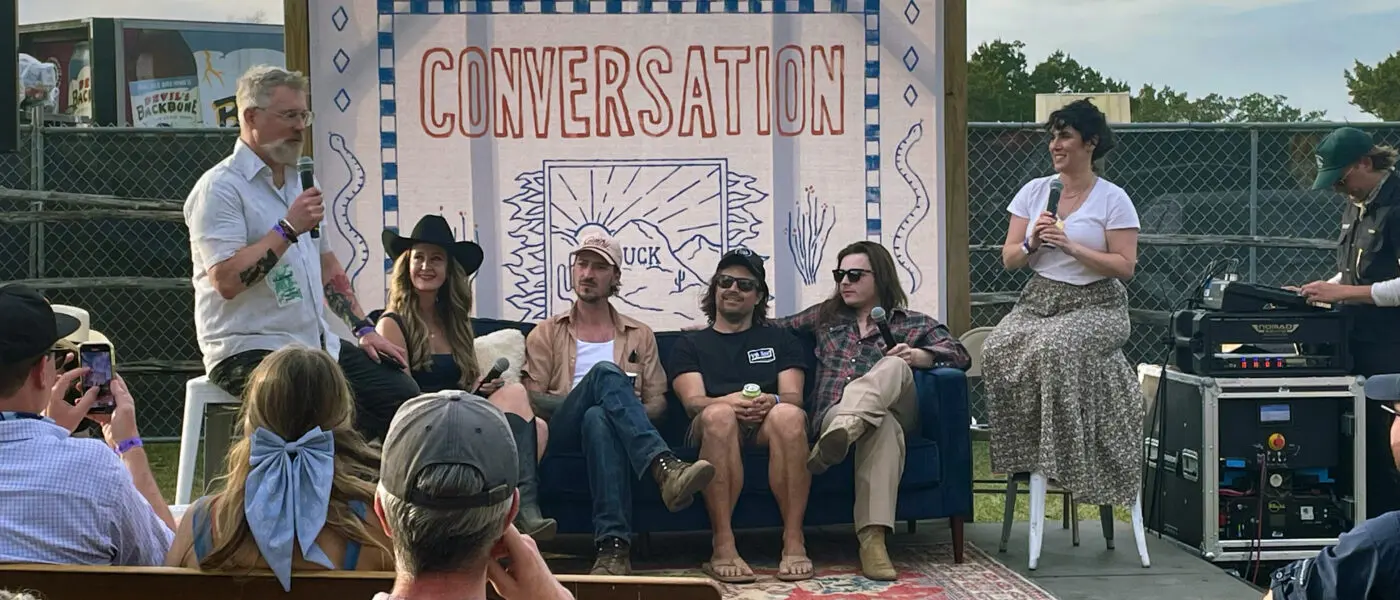
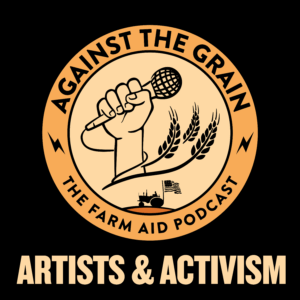 Listen to the Artists and Activism series of Against the Grain: The Farm Aid Podcast to hear from more than two dozen artists who use their art and voices as vehicles for political engagement and expression on issues that matter to them.
Listen to the Artists and Activism series of Against the Grain: The Farm Aid Podcast to hear from more than two dozen artists who use their art and voices as vehicles for political engagement and expression on issues that matter to them.
